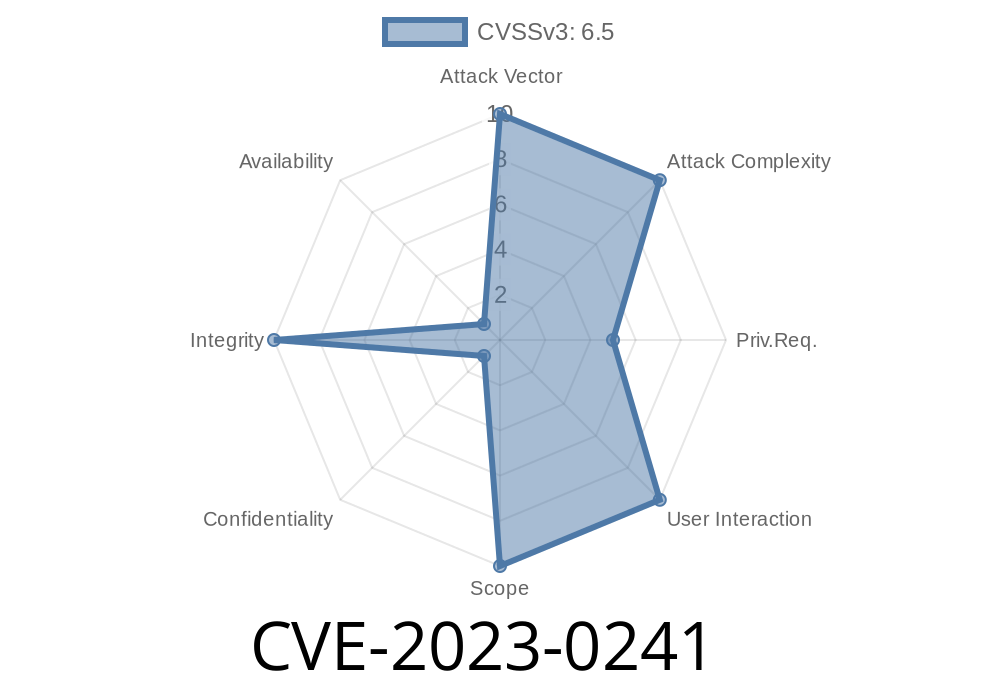pgAdmin 4 is among the most popular open-source administration and management tools for PostgreSQL databases worldwide. But, like any powerful tool, it sometimes carries security risks if not handled—or patched—promptly.
One such risk, discovered in early 2023, is identified as CVE-2023-0241. This directory traversal vulnerability, affecting all pgAdmin 4 versions prior to v6.19, could let an attacker break free from the intended file access restrictions. In simple terms, a user could end up reading or changing another user’s settings—or worse, tamper with critical database configuration files.
In this post, we’ll break down what CVE-2023-0241 is, how it works, walk through a conceptual exploit, and share practical steps for protecting your PostgreSQL environments.
What Is CVE-2023-0241?
According to the original advisory and the pgAdmin release notes, this bug is a directory traversal vulnerability. The problem lies in how pgAdmin 4 handles file paths it receives from users.
A malicious user—one with access to the pgAdmin interface—can craft file paths with special character sequences (like ../) to break out of their restricted area. As a result, they could access files and settings they’re never supposed to see or modify.
Let’s look at the flow
1. User Interface Flaw: In some areas (for example, backup/restore operations or setting exports/imports), pgAdmin 4 lets you pick a file path on the server.
2. Path Not Properly Sanitized: If you set the file path to something like ../../someotheruser/settings.json, pgAdmin 4 trusts you and tries to access that location!
3. Escaping the Sandbox: Instead of sticking to your permitted folder, you just reached elsewhere on the system, where you have no business meddling.
1. Check pgAdmin Version
You’re vulnerable if you’re using any version of pgAdmin 4 before v6.19.
pgadmin4 --version
If your output says anything like pgAdmin 4 v6.18 or lower, UPDATE as soon as possible!
2. Simulated Exploit Using the Backup Feature
Let’s say there are two users on the system: alice and bob. pgAdmin 4 runs as a web service, both can log in and use their own settings.
Normally, bob should never be able to read or write files in alice's settings.
Bob selects the Backup feature in pgAdmin 4
2. When prompted to specify the file path for the backup, instead of using his default folder (/var/lib/pgadmin/backups/bob/), he enters:
`
../../alice/settings.json
`
3. If pgAdmin 4 doesn’t sanitize this, bob can now access or overwrite Alice’s settings JSON—the store of her database interface preferences and possibly stored connection info.
Sample Vulnerable Code (Simplified)
@app.route('/backup', methods=['POST'])
def backup():
path = request.form['filepath'] # User-provided!
# Vulnerable: Not checking for ../ or absolute paths
full_path = os.path.join(USER_HOME, path)
with open(full_path, 'w') as f:
# Write backup data
pass
The application should sanitize inputs, ensuring users can only access their own folders
import os
@app.route('/backup', methods=['POST'])
def backup():
path = request.form['filepath']
user_dir = os.path.abspath(os.path.join(USER_HOME, session['username']))
requested_path = os.path.abspath(os.path.join(user_dir, path))
if not requested_path.startswith(user_dir):
return "Invalid file path!", 400
with open(requested_path, 'w') as f:
# Safe: Only operates in safe user dir
pass
What Could an Attacker Do?
- Overwrite Another User’s Settings: Change dashboard preferences, connections, or even credential storage (if available).
Hijack Configuration: Modify files critical to database connectivity or functionality.
- Persistence: By hijacking configuration, attackers could ensure their access remains hidden or is easily re-established after a password reset.
Who’s Most at Risk?
- PgAdmin 4 multi-user installations: Teams or companies using one centralized pgAdmin 4 server—very common in enterprise or classroom settings.
- Cloud/Hosted PGAdmin Services: Shared environments are vulnerable to "tenant hopping."
- Linux/Mac/Windows: Vulnerability is platform-agnostic.
1. Upgrade Immediately
Update to pgAdmin 4 v6.19 or newer where this issue is fully patched.
- Download the latest version
2. Check Logs for Suspicious Paths
Audit your pgAdmin and PostgreSQL logs for odd file accesses, especially ones using .. or files belonging to other users.
3. Harden Server Permissions
Even after patching, make sure OS-level permissions don’t allow pgAdmin users to read or write each others’ files directly outside of their allowed zones.
4. Consider Segregating User Spaces
If possible, split users across separate pgAdmin instances or containers for maximum isolation.
More Reading & References
- CVE-2023-0241 on NIST NVD
- pgAdmin 4 v6.19 Release Notes (Fixes and Changes)
- OWASP: Path Traversal Cheat Sheet
Conclusion
_CVE-2023-0241 is a real-world reminder: even trusted open source tools can have dangerous vulnerabilities. By updating, auditing, and configuring carefully, you can make sure your team’s database workspaces are safe from prying eyes—and wandering hands._
Timeline
Published on: 03/27/2023 21:15:00 UTC
Last modified on: 04/01/2023 01:49:00 UTC
